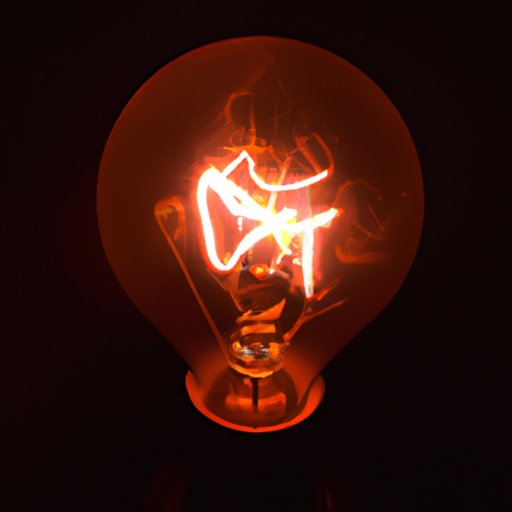Introduction
The invention of the light bulb is one of the most remarkable human achievements of the modern era. It completely revolutionized the way people lived, worked, and interacted with their environment. This article will explore the history and science behind the invention of the light bulb, as well as how it has changed society in both positive and negative ways.

A Historical Account of the Invention of the Light Bulb
The invention of the light bulb is usually attributed to Thomas Edison, who patented the first commercially successful incandescent light bulb in 1879. However, Edison was not the first person to come up with the idea of using electricity to create light. In fact, several inventors had been experimenting with the concept for decades prior to Edison’s patent. One of the earliest attempts at creating a light bulb was made by English inventor Humphry Davy in 1802, who created an arc lamp that used carbon rods and an electric current to create light.
In 1854, British chemist Joseph Swan created a light bulb that used a carbon filament in a vacuum sealed glass bulb. While this model was more efficient than previous models, it was still too inefficient and expensive to be commercially viable. It wasn’t until Thomas Edison developed a light bulb with a higher quality filament in 1879 that the light bulb became a viable option for commercial use.
Edison’s light bulb was made from a bamboo filament, which was encased in an evacuated glass bulb. This design allowed the filament to last much longer than previous designs, and it quickly became the standard for all light bulbs. Edison’s inventions also laid the groundwork for the electrical grid, which allowed the widespread adoption of the light bulb.
How the Invention of the Light Bulb Changed Society
The invention of the light bulb had a profound impact on everyday life. It allowed people to work and study after dark, and it also provided a source of light in places where natural light was not available. The invention of the light bulb also allowed factories to operate around the clock, which resulted in an increase in production and efficiency.
The invention of the light bulb also led to the expansion of the electrical grid. This allowed electricity to be distributed to homes and businesses, and it made it possible for people to enjoy the convenience of electric appliances and devices. This expansion of the electrical grid also allowed for the development of new technologies, such as televisions and computers.

Exploring the Science Behind the Invention of the Light Bulb
The invention of the light bulb was made possible by advances in both physics and chemistry. In order for a light bulb to work, it must have a filament that can resist the flow of electricity without burning out. This requires a material that can withstand high temperatures and not break down when exposed to an electric current.
The filament in a light bulb is typically made of tungsten, which has a melting point of 3422°C. This allows the filament to remain intact when exposed to the electric current, and it also helps to keep the temperature of the filament low enough to avoid burning out. The glass bulb surrounding the filament helps to maintain a vacuum, which prevents the filament from oxidizing.
In addition to the filament, the light bulb also contains other materials that help it function properly. The base of the bulb is typically made of metal, which is used to conduct the electric current from the power source to the filament. The glass bulb is also filled with inert gases, such as argon, which helps to prevent the filament from burning out.
Conclusion
The invention of the light bulb is one of the most important inventions in human history. It revolutionized the way people lived, worked, and interacted with their environment. This article explored the history and science behind the invention of the light bulb, as well as how it has changed society in both positive and negative ways. It is clear that the invention of the light bulb has had a profound impact on the world, and it is likely to continue to do so for many years to come.
(Note: Is this article not meeting your expectations? Do you have knowledge or insights to share? Unlock new opportunities and expand your reach by joining our authors team. Click Registration to join us and share your expertise with our readers.)
